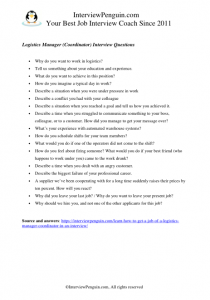We live in a global economy. Countries, let alone factories are interdependent. Goods need to reach their destination in time, and logistics managers bear the responsibility, and enjoy the recognition for their great work. This career has been on the rise. Logistics managers earn more each year, and you definitely made a good career choice. The question is how can you succeed in an interview? We will try to find the answer together.
Table of Contents
Degree does not play a pivotal role
Speaking from my experience in automotive industry recruitment, employers aren’t too concerned about the education of job applicants who apply for leading roles in logistics.
Logistics coordinator, or a logistics manager, should typically have at least Bachelor’s degree (in supply chain management, business management etc). But employers are not overly strict with this one. I actually witnessed people getting the jobs with no degree.
Skills that will be tested in your interview
The reason why degree doesn’t matter for many hiring manager is that the education can hardly prepare you for the hectic fashion of a typical warehouse or logistics center. You will have to learn the job, you will have to test the waters first. And the learning curve will be rather steep.
Being aware of the situation, hiring managers are interested first and foremost in your skills, opinions, and attitudes, such as flexibility, ability to learn quickly, independent thinking, ability to make decisions on a go, communication skills, teamwork ability, leadership skills, and understanding for technical terms and the industry.
The questions they will ask you will help them to understand how ready you are. Alternatively, in some big companies, you will have to pass the assessment test for Logistics, Freight & Shipping employees.
If your recruiter/hiring manager notified you about the need to pass a test, you can prepare for it in advance with an excellent test practice package from JobTestPrep (find the test specific for your employer in their long list of tests). If you won’t take a test, please continue reading further, to learn how to answer the questions you will face.
Questions you will face in your logistics interview
We can basically talk about three types of questions. First one, simple personal interview questions, help the hiring managers to understand your communication skills, motivation, your experience and education, and basically they help them to get a good grasp of your personality.
Second type, the behavioral interview questions (or situational questions), help them to understand how you’d deal with specific situations that happen in the workplace, such as disobedience of employees, conflict with your colleagues, meeting a tight deadline, experiencing a stop line, handling pressure, etc.
Your answers to the last group of questions, the technical group, serve as an indicator of your knowledge of logistics, warehouse, supply chain, and the entire order cycle. Now we will analyze a few questions from each group. Let’ go!
Why do you want to work in logistics?
Jobs in logistics aren’t easy. You may often work overtime, you will respond for a lot of things, and a big mistake in your work can prove almost fatal for the company. So what is your motivation?
If possible, try to speak mostly about the benefits the employer will gain, while employing you, rather than about things you want to gain with this job. Of course you can mention also an interesting scope of duties and a vast learning opportunity, as well as the prestige the position brings, and an impact you can have on their business. These things should come secondary, however.
You can say that you believe to have good skills for the job, such as coordinating and leadership skills, understanding for the business they’re in (or at least interest to learn more about it), that you believe you can really bring some value to the employer.
You can also say that you are eager to learn, and like the wide range of responsibilities of logistics manager, and basically consider it an interesting and challenging job.
* May also interest you: Warehouse manager interview questions.
Tell us something about your education and experience.
The key is to speak about relevant things. Since logistics managers respond for a variety of duties, you can nearly always find some correlation between your field of study and the job. Managing, organizing, planning, hiring, training, dealing with technical stuff–all of that is included in this interesting occupation.
Speaking about your previous experience (if you have any), pick the most relevant roles, or at least working duties that are somehow relevant to logistics. It can be anything that has a connection to order cycle, employee management, negotiations, or even customer service.
What do you want to achieve in this position?
Do you think only about yourself (and your loved ones), or do you care also about the employer? Do you want to achieve something good only for you, or do you hope to accomplish something great for your employer, and grow as a person and manager along the way?
Obviously employers look for people who want to do something for them—and there’s a lot to achieve in logistics: Maintaining a smooth operation of the warehouse, improving the coordination of the transportation and delivery of goods, reducing the times between production and delivery, etc.
Speaking about these things you send a clear sign to the employer that you care about their success, and aren’t in only for a quick buck, promotion, or personal achievements…
Special Tip: To know how to answer a question, and to come up with a great answer on a big day, when facing a panel of interviewers, are two different things. Very different things. Check the eBook I wrote for you, the Logistics Manager Interview Guide, for multiple brilliant answers to 25 most common logistics manager interview questions. Get rid of stress, streamline your interview preparation, and learn something your competitors won’t know in the interviews…
How do you imagine a typical day in work?
This is hard to foresee before you start the job. Each company has their own problems and ways of distributing labor and responsibility in the warehouse, and logistics in general, but most of the time you’ll take care of a variety of duties. Sometimes a job description can give you a clue on the basic duties and responsibilities, so read it carefully.
One way or another, you should talk about planning and managing the transportation of goods, and about optimizing and coordinating full order cycle. Liaising and negotiating with suppliers, manufacturers, retailers and consumers does also often belong to the duties of logistics manager, but other employees take care of that in some companies.
The key is to show them that you like to be busy, and are ready to take care of variety of tasks (or learn to take care of them).
Special Tip: You can also download the full list of questions in a simple one-page long .PDF document, and practice your interview answers anytime later:
Describe a situation when you were under pressure in work
The amount of pressure you’ll experience depends partially on you, and partially on the level of organization in the factory/warehouse. In any case, you will face some deadlines, and you may experience pressure (from the buyers, suppliers, superiors, subordinates, from yourself).
The key is to narrate a situation (a real or a fictive one) when you managed to handle the pressure. It can be anything from work or school. Try to show them that you can stay focused on the task at hand, and prioritize your work. Show them that you do not crack under pressure and try to keep a cool head in all circumstances.
Describe a conflict you had with your colleague
Conflicts belong to every workplace, and we can not entirely avoid them. Interviewers try to understand your attitude to conflict, if you always blame the other person, or if you can admit making a mistake.
They also try to assess if you solve the conflicts constructively, or destructively, cutting your connection with the conflict party—which would be a terrible approach in logistics, since we can not afford losing a supplier or even a customer—just because of some personal struggles.
You should show them that you try to avoid conflicts, staying honest and friendly to your colleagues. When it happened, however (and it has for sure happened in your life), show them that you looked for a constructive solution, and that you tried your best to ensure that the conflict would not affect your work, or the work of your colleagues, once the waters settled again…
Describe a time when you struggled to communicate something to your boss, colleague, or to a customer. How did you manage to get your message over?
Interviewers try to find out if you know how to talk to people from other departments of the company, people who may not understand your professional jargon, or people from the lower echelons of workforce (the laborers). They try to see if you can explain difficult things in a simple way, in the language of common people.
Try to mention that you are always patient when explaining things to other people, that you use pictures, charts and practical examples to make things easier. And if you struggled to get the message over because you knew that the recipient would not like your words, you should say that you tried to say them in a way that would not touch the recipient personally.
Other questions you may get in your logistics interview
-
What’s your experience with automated warehouse systems?
- Are you familiar with ISO requirements and health regulations?
-
How do you schedule shifts for your team members?
- In your opinion, what is the most important thing to do to ensure that customers receive their products on time?
- What would you do if one of the operators did not come to the shift, and you could not reach them on their phone number?
- How do you feel about firing someone? What would you do if your best friend (who happens to work under you) came to work drunk? Would you dismiss them?
- Describe the biggest failure of your professional career.
- A supplier we’ve been cooperating with for a long time suddenly raises their prices by ten percent. How will you react?
- Why should we hire you, and not one of the other applicants for this job?
- …………
Conclusion, great answers to all questions
Interview for a job of a logistics manager (coordinator) belongs to difficult job interviews. Not only will you compete with other quality people for the position, but you will have to answer a variety of questions in an interview.
If you are not sure how to answer the questions (you are not alone), have a look at an eBook I wrote for you, the Logistics Manager Interview Guide. It includes multiple brilliant answers to twenty five most common logistics manager interview questions (including the difficult behavioral questions). You can see some great sample answers to interview questions on the eBook page, so even if you do not want to purchase anything, it still makes sense to check it out (to read the answers…)
That’s it, thank you for reading, and good luck in your interviews!
Matthew Chulaw, InterviewPenguin.com
May also interest you:
- Leadership interview questions – An essential skill for every good manager, your leadership skills will be tested in an interview for virtually any managerial job. Are you ready to demonstrate them in an interview?
- Operations manager interview questions.
- Salary negotiation tips – Learn how to convince them to make you a better offer in an interview.


